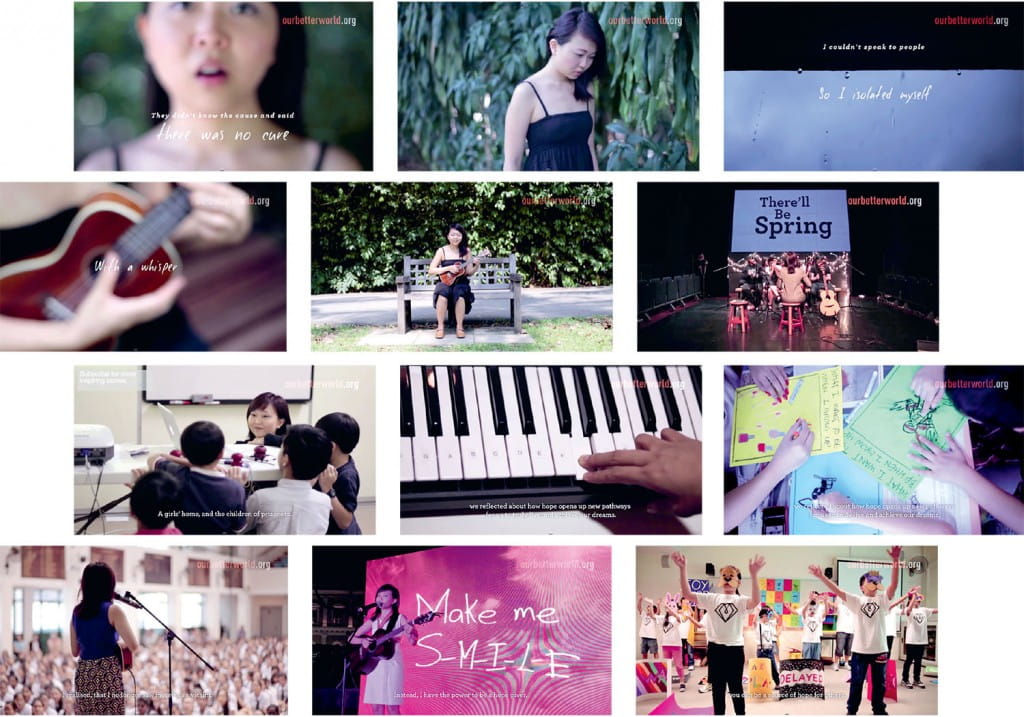Stories > Singing For Hope
Singing For Hope

THIS STORY WON THE GOOD STORY OF THE YEAR AWARD FROM OURBETTERWORLD, THE DIGITAL STORYTELLING INITIATIVE OF THE SINGAPORE INTERNATIONAL FOUNDATION. VISIT WWW.OURBETTERWORLD.ORG/STORY/LOST-HER-VOICE-AND-FOUND- HER-SONG TO FIND OUTMORE ABOUT DIAMONDS ON THE STREET.
What began as a personal crisis for singer-songwriter Crystal Goh led to the start of a public movement for marginalised communities. This is the story of how she lost her voice but found hope to inspire others through songs. BY DESMOND NG
inger-songwriter Crystal Goh, 29, woke up one morning in 2011 and found that she had lost her voice.
Doctors diagnosed it as a rare neurological disorder called spasmodic dysphonia, which causes the voice muscles in the larynx, or voice box, to contract and spasm involuntarily.
It can result in the voice breaking up or having a strained, tight or strangled quality. The cause is unknown and there is no cure for the condition.
It was a huge and painful blow for Goh, who had been singing and writing songs since 2007.
Overnight, ordinary things like talking to friends or expressing herself during work meetings suddenly became a challenge. And as a singersongwriter, she could no longer perform.
She plunged into a deep despair: “I lost all hope of ever speaking again. I couldn’t speak to people. So I isolated myself.”
But her friends and family continued to encourage her and express hope in her recovery. She later found comfort in friends, both old and new, who identified with her suffering and brokenness.
One of them had contracted tongue cancer and was learning how to speak again after her operation. Another had recovered from a speech impediment a few years ago.
She said: “We communicated amidst our vocal disabilities. It took deliberate effort to hold conversations in quiet spaces, to use hand gestures to compensate for the lack of speech, and to get used to our slightly slurred or constricted speech... They believed in my recovery when I couldn’t. They also encouraged me to continue writing songs and to sing.”
FROM DESPAIR TO HOPE
In 2013, Goh’s voice slowly started to return, starting with a whisper that grew louder and stronger. Uplifted by the turn of events, she wrote a song to encourage herself and decided to share it with those in the at-risk community to motivate them to get through their difficulties.
That song, There’ll Be Spring, was the beginning of Diamonds on the Street (DOTS), a Singapore arts collective that Goh started with a group of friends. It seeks to empower marginalised communities and individuals by encouraging them to express themselves through music, stories and performances.
She said: “We believe that the reflective and dignifying process of songwriting and storytelling has therapeutic elements, and can help to connect a young person to his or her emotions, as well as develop a capacity for critical thinking required to question his or her current situation.”
Over six months, DOTS worked together with about 30 youth and children, comprising troubled teenage girls from Residence @ St. George’s and children of prisoners from the Prison Fellowship Singapore Care Club, to write and record five songs borne out of their pain and hopes.
Said Goh: “We reflected on how hope opens up new pathways for us to truly live and achieve our dreams, even when faced with tragedy.”
DOTS also organised three showcases where the young people performed the songs they wrote to their friends, loved ones and selected members of the public. The songs were also made available for purchase on DOTS’s website.
Witnessing the transformation of the young people in the process, Goh added: “Looking at them, I understood the purpose of pain. Pain teaches empathy. It allows me to comfort and connect with another person in pain.”
Although her voice has since improved (it is easier for her to hit the high notes compared to the lower notes when singing), she has yet to recover completely.
But Goh no longer sees herself as a victim: “Instead, I have the power to be a hope giver. And this can be true for you.
If you’re willing to share your journey, no matter what you’ve gone through, you can be a source of hope for others.”
